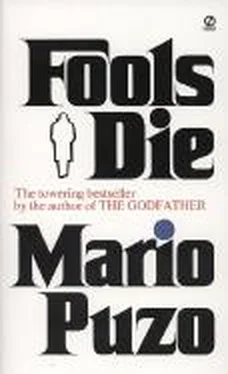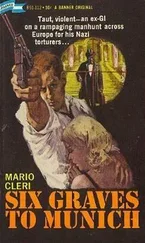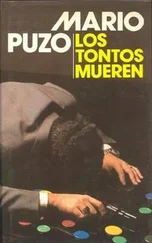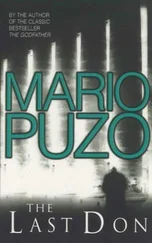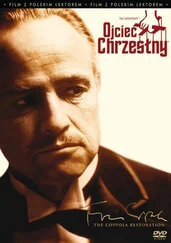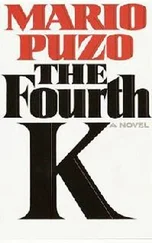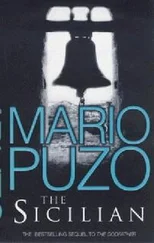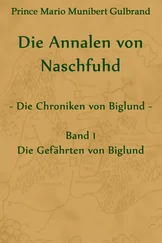Mario Puzo - Fools die
Здесь есть возможность читать онлайн «Mario Puzo - Fools die» весь текст электронной книги совершенно бесплатно (целиком полную версию без сокращений). В некоторых случаях можно слушать аудио, скачать через торрент в формате fb2 и присутствует краткое содержание. Жанр: Современная проза, на английском языке. Описание произведения, (предисловие) а так же отзывы посетителей доступны на портале библиотеки ЛибКат.
- Название:Fools die
- Автор:
- Жанр:
- Год:неизвестен
- ISBN:нет данных
- Рейтинг книги:3 / 5. Голосов: 1
-
Избранное:Добавить в избранное
- Отзывы:
-
Ваша оценка:
- 60
- 1
- 2
- 3
- 4
- 5
Fools die: краткое содержание, описание и аннотация
Предлагаем к чтению аннотацию, описание, краткое содержание или предисловие (зависит от того, что написал сам автор книги «Fools die»). Если вы не нашли необходимую информацию о книге — напишите в комментариях, мы постараемся отыскать её.
Fools die — читать онлайн бесплатно полную книгу (весь текст) целиком
Ниже представлен текст книги, разбитый по страницам. Система сохранения места последней прочитанной страницы, позволяет с удобством читать онлайн бесплатно книгу «Fools die», без необходимости каждый раз заново искать на чём Вы остановились. Поставьте закладку, и сможете в любой момент перейти на страницу, на которой закончили чтение.
Интервал:
Закладка:
“OK,” Alice said. “I just thought you’d want to know. I thought you might want to come out.”
“I really haven’t seen her or spoken to her for a long time,” I said. And I remember Janelle asking, “Would you deny me?” and my saying laughingly, “With all my heart.”
Alice said, “She loved you more than any other man.”
But she didn’t say “more than anybody,” I thought. She left out women. I said, “Maybe she’ll be OK. Will you call me again?”
“Yes,” Alice said. Her voice was calmer now. She had begun to grasp my rejection and she was bewildered by it. “I’ll call you as soon as something happens.” Then she hung up.
And I laughed. I don’t know why I laughed, but I just laughed. I couldn’t believe it, it must be one of Janelle’s tricks. It was too outrageously dramatic, something I knew she had fantasized about and so had arranged this little charade. And one thing I knew, I would never look upon her empty face, her beauty vacated by the brain behind it. I would never, never look at it because I would be turned to stone. I didn’t feel any grief or sense any loss. I was too wary for that. I was too cunning. I walked around the rest of the day, shaking my head. Once again I laughed and later I caught myself with my face twisting in a kind of smirk, like someone with a guilty secret wish come true, or of someone who is finally trapped forever.
Alice called me late the next day. “She’s all right now,” Alice said.
And for a minute I thought she meant it, that Janelle had recovered, that it had all been a mistake. And then Alice said, “We pulled the plug. We took her off the machines and she’s dead.”
Neither of us said anything for a long time, and then she asked, “Are you going to come out for the funeral? We’re going to have a memorial service in the theater. All her friends are coming. It’s going to be a party with champagne and all her friends giving speeches about her. Will you come?”
“No,” I said. “I’ll come in a couple of weeks to see you if you don’t mind. But I can’t come now.”
There was another long pause if she were trying to control her anger, and then she said, “Janelle once told me to trust you, so I do. Whenever you want to come out, I’ll see you.”
And then she hung up.
The Xanadu Hotel loomed before me, its million-dollar marquee of bright lights drowned the lonely hills beyond. I walked past it, dreaming of those happy days and months and years I had spent seeing Janelle. Since Janelle’s death I had thought of her nearly every day. Some mornings I’d wake up thinking about her, imagining how she looked, how she could be so affectionate and so furious at the same time.
Those first few minutes awake I always believed she was alive. I’d imagine scenes between us when we met again. It took me five or ten minutes to remember she was dead. With Osano and Artie this had never happened. In fact, I rarely thought of them now. Did I care for her more? But then if I felt that way about Janelle, why my nervous laugh when Alice told me the news over the phone? Why, during the day I heard of her death, did I laugh to myself three or four times? And I realize now perhaps it was because I was enraged with her for dying. In time, if she had lived, I would have forgotten her. By her trickery she would haunt me all my life.
When I saw Alice a few weeks after Janelle’s death, I learned that the cerebral hemorrhage came from a congenital defect which Janelle may have known about.
I remembered how angry I was when she was late or the few times she forgot the day on which we were supposed to meet. I was so sure they were Freudian slips, her unconscious wish to reject me. But Alice told me that this had happened often with Janelle. And had gotten worse shortly before her death. It was certainly linked to the bulging aneurysm, the fatal leakage into her brain. And then I remembered that last night with her when she had asked me if I loved her and I had answered her so insolently. And I thought if she could only ask me now, how different I would be. That she could be and say and do whatever she wishes. That I would accept anything she wanted to be. That just the thought that I could see her, that she was someplace I could go to, that I could hear her voice or hear her laugh would be the things that could make me happy. “Ah, then,” I could hear her ask, pleased but angry too, “but is it the important thing to you?” She wanted to be the most important thing to me and to everyone she knew and, if possible, to everyone in the world. She had an enormous hunger for affection. I thought of bitter remarks for her to make to me as she lay in bed, her brain shattered as I looked down upon her with grief. She would say, “Isn’t this the way you wanted me? Isn’t that the way men want women? I would think this would be ideal for you.” But then I realized she never would have been so cruel or even so vulgar, and then I realized another odd thing. My memories of her were never about our lovemaking.
I know I dream of her many times at night, but I never remember those dreams. I just wake up thinking about her as if she were still alive.
– -
I was on the very top of the Strip, in the shadow of the Nevada mountains, looking down into the huge, glittering neon nest that was the heart of Vegas. I would gamble tonight and in the early morning I’d catch a plane for New York. Tomorrow night I would sleep with my family in my own house and work on my books in my solitary room. I would be safe.
I entered the doors of the Xanadu casino. I was chilled by the frozen air. Two spade hookers went gliding by arm in arm, their heavy curly wigs glistening, one dark chocolate, the other sweetly brown. Then white hookers in boots and short shorts offering pearly white thighs, but the skin of their faces ghostly, showing skeleton bones thinned by chandeliered light and years of cocaine. Down the gauntlet of green felt blackjack tables a long row of dealers raised their hands and washed them in the air.
I went through the casino toward the baccarat pit. And as I approached the gray-railed enclosure, the crowd in front of me broke to spread around the dice pit and I saw the bacarrat pit clear.
Four Saints in black tie waited for me. The croupier running the game held up his right hand to halt the Banker with the shoe. He gave me a quick glance and smiled his recognition. Then with his hand still up he intoned, “A card for the Player.” The laddermen, two pale Jehovah, leaned forward.
I turned away to watch the casino. I felt a rush of oxygenated air and I wondered if the senile, crippled Gronevelt in his solitary rooms above had pushed his magic buttons to keep all these people awake. And what if he had pushed the button for Cully and all the others to die?
Standing absolutely still in the center of the casino, I looked for a lucky table on which to begin.
Chapter 55
“I suffer, but still I don’t live. I am an X in an indeterminate equation. I am a sort of phantom in life who has lost all beginning and end.”
I read that in the asylum when I was fifteen or sixteen years old, and I think Dostoevsky wrote it to show the unending despair of mankind and perhaps to instill terror in everyone’s heart and persuade them to a belief in God. But long ago, as a child when I read it, it was a beam of light. It comforted me, being a phantom didn’t frighten me. I thought that X and its indeterminate equation were a magic shield. And now having remained so prudently alive, having passed through all the dangers and all the suffering, I could no longer use my old trick of projecting myself forward into time. My own life was no longer that painful and the future could not rescue me. I was surrounded by countless tables of chance and I was under no illusion. I knew now the single fact that no matter how carefully I planned, no matter how cunning I was, lies or good deeds done, I couldn’t really win.
Читать дальшеИнтервал:
Закладка:
Похожие книги на «Fools die»
Представляем Вашему вниманию похожие книги на «Fools die» списком для выбора. Мы отобрали схожую по названию и смыслу литературу в надежде предоставить читателям больше вариантов отыскать новые, интересные, ещё непрочитанные произведения.
Обсуждение, отзывы о книге «Fools die» и просто собственные мнения читателей. Оставьте ваши комментарии, напишите, что Вы думаете о произведении, его смысле или главных героях. Укажите что конкретно понравилось, а что нет, и почему Вы так считаете.
